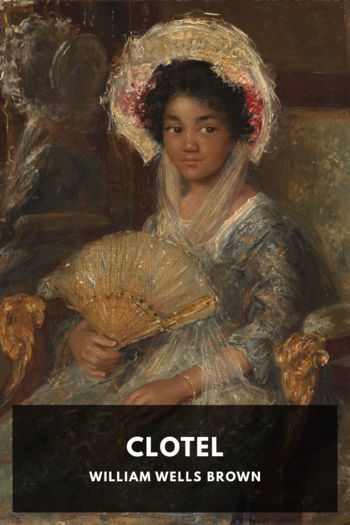Clotel, William Wells Brown [i like reading books .txt] 📗

- Author: William Wells Brown
Book online «Clotel, William Wells Brown [i like reading books .txt] 📗». Author William Wells Brown
The arrest of the fugitive was announced in all the newspapers, but created little or no sensation. The inhabitants were too much engaged in putting down the revolt among the slaves; and although all the odds were against the insurgents, the whites found it no easy matter, with all their caution. Every day brought news of fresh outbreaks. Without scruple and without pity, the whites massacred all blacks found beyond their owners’ plantations: the negroes, in return, set fire to houses, and put those to death who attempted to escape from the flames. Thus carnage was added to carnage, and the blood of the whites flowed to avenge the blood of the blacks. These were the ravages of slavery. No graves were dug for the negroes; their dead bodies became food for dogs and vultures, and their bones, partly calcined by the sun, remained scattered about, as if to mark the mournful fury of servitude and lust of power. When the slaves were subdued, except a few in the swamps, bloodhounds were put in this dismal place to hunt out the remaining revolters. Among the captured negroes was one of whom we shall hereafter make mention.
XXV Death Is FreedomI asked but freedom, and ye gave
Chains, and the freedom of the grave.
There are, in the district of Columbia, several slave prisons, or “negro pens” as they are termed. These prisons are mostly occupied by persons to keep their slaves in when collecting their gangs together for the New Orleans market. Some of them belong to the government, and one in particular is noted for having been the place where a number of free coloured persons have been incarcerated from time to time. In this district is situated the capital of the United States. Any free coloured persons visiting Washington, if not provided with papers asserting and proving their right to be free, may be arrested and placed in one of these dens. If they succeed in showing that they are free, they are set at liberty, provided they are able to pay the expenses of their arrest and imprisonment; if they cannot pay these expenses, they are sold out. Through this unjust and oppressive law, many persons born in the Free States have been consigned to a life of slavery on the cotton, sugar, or rice plantations of the Southern States. By order of her master, Clotel was removed from Richmond and placed in one of these prisons, to await the sailing of a vessel for New Orleans. The prison in which she was put stands midway between the capitol at Washington and the President’s house. Here the fugitive saw nothing but slaves brought in and taken out, to be placed in ships and sent away to the same part of the country to which she herself would soon be compelled to go. She had seen or heard nothing of her daughter while in Richmond, and all hope of seeing her now had fled. If she was carried back to New Orleans, she could expect no mercy from her master.
At the dusk of the evening previous to the day when she was to be sent off, as the old prison was being closed for the night, she suddenly darted past her keeper, and ran for her life. It is not a great distance from the prison to the Long Bridge, which passes from the lower part of the city across the Potomac, to the extensive forests and woodlands of the celebrated Arlington Place, occupied by that distinguished relative and descendant of the immortal Washington, Mr. George W. Curtis. Thither the poor fugitive directed her flight. So unexpected was her escape, that she had quite a number of rods the start before the keeper had secured the other prisoners, and rallied his assistants in pursuit. It was at an hour when, and in a part of the city where, horses could not be readily obtained for the chase; no bloodhounds were at hand to run down the flying woman; and for once it seemed as though there was to be a fair trial of speed and endurance between the slave and the slave-catchers. The keeper and his forces raised the hue and cry on her pathway close behind; but so rapid was the flight along the wide avenue, that the astonished citizens, as they poured forth from their dwellings to learn the cause of alarm, were only able to comprehend the nature of the case in time to fall in with the motley mass in pursuit (as many a one did that night), to raise an anxious prayer to heaven, as they refused to join in the pursuit, that the panting fugitive might escape, and the merciless soul dealer for once be disappointed of his prey. And now with the speed of an arrow—having passed the avenue—with the distance between her and her pursuers constantly increasing, this poor hunted female gained the “Long Bridge,” as it is called, where interruption seemed improbable, and already did her heart begin to beat high with the hope of success. She had only to pass three-fourths of a mile across the bridge, and she could bury herself in a vast forest, just at the time when the curtain of night would close around her, and protect her from the pursuit of her enemies.
But God by his Providence had otherwise determined. He had determined that an appalling tragedy should be enacted that night, within plain sight of the President’s house and the capital of the Union, which should be an evidence wherever it should be known, of the unconquerable love of liberty the heart may inherit; as well as a fresh admonition to the slave dealer,





Comments (0)